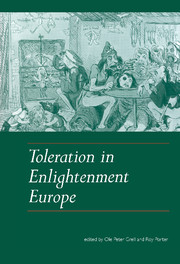Book contents
- Frontmatter
- Contents
- List of contributors
- Preface
- 1 Toleration in Enlightenment Europe
- 2 Toleration and the Enlightenment Movement
- 3 Multiculturalism and Ethnic Cleansing in the Enlightenment
- 4 Intolerance, the Virtue of Princes and Radicals
- 5 Spinoza, Locke and the Enlightenment Battle for Toleration
- 6 Toleration and Enlightenment in the Dutch Republic
- 7 Toleration and Citizenship in Enlightenment England: John Toland and the Naturalization of the Jews, 1714–1753
- 8 Citizenship and Religious Toleration in France
- 9 A Tolerant Society? Religious Toleration in the Holy Roman Empire, 1648–1806
- 10 Enlightenment in the Habsburg Monarchy: History of a Belated and Short-Lived Phenomenon
- 11 Toleration in Eastern Europe: the Dissident Question in Eighteenth-Century Poland–Lithuania
- 12 Toleration in Enlightenment Italy
- 13 Inquisition, Tolerance and Liberty in Eighteenth-Century Spain
- Index
5 - Spinoza, Locke and the Enlightenment Battle for Toleration
Published online by Cambridge University Press: 03 February 2010
- Frontmatter
- Contents
- List of contributors
- Preface
- 1 Toleration in Enlightenment Europe
- 2 Toleration and the Enlightenment Movement
- 3 Multiculturalism and Ethnic Cleansing in the Enlightenment
- 4 Intolerance, the Virtue of Princes and Radicals
- 5 Spinoza, Locke and the Enlightenment Battle for Toleration
- 6 Toleration and Enlightenment in the Dutch Republic
- 7 Toleration and Citizenship in Enlightenment England: John Toland and the Naturalization of the Jews, 1714–1753
- 8 Citizenship and Religious Toleration in France
- 9 A Tolerant Society? Religious Toleration in the Holy Roman Empire, 1648–1806
- 10 Enlightenment in the Habsburg Monarchy: History of a Belated and Short-Lived Phenomenon
- 11 Toleration in Eastern Europe: the Dissident Question in Eighteenth-Century Poland–Lithuania
- 12 Toleration in Enlightenment Italy
- 13 Inquisition, Tolerance and Liberty in Eighteenth-Century Spain
- Index
Summary
Of the two principal traditions of toleration theory in seventeenth-century Europe, what have been termed the ‘Arminian’ and the ‘republican’, the first culminates in Locke and the second in Spinoza. Both theories were products of the late seventeenth-century European intellectual ferment, both were deployed in England during the public debate about toleration in the aftermath of the Glorious Revolution, and both were destined to exert a pervasive influence in intellectual debate throughout Protestant and Catholic Europe during the eighteenth century. Yet an immense philosophical and ideological gulf separates the two – one might almost say rival – conceptions of toleration, a gulf which becomes greater the more it is considered. For if ‘we should be wary’, as Dr Davidson observes in chapter 12 of this volume, ‘of equating a call for religious toleration too easily with a call for unlimited freedom of belief’ it was generally true of Enlightenment Europe that religious toleration in the sense expounded by Le Clerc, Van Limborch and Locke, or at least something approaching it, gained much wider acceptance than did freedom of thought and expression in Spinoza's sense and that of the radical Deists. What was deemed the acceptable face of toleration, the toleration of Locke and Le Clerc, was aptly characterized by the Venetian theologian, Daniel Concina, in 1754, in a work identifying Spinoza and Spinozism as the backbone of the Deist threat to Christianity, as in essence a ‘tollerantismo between the Christian churches’.
- Type
- Chapter
- Information
- Toleration in Enlightenment Europe , pp. 102 - 113Publisher: Cambridge University PressPrint publication year: 1999
- 7
- Cited by



